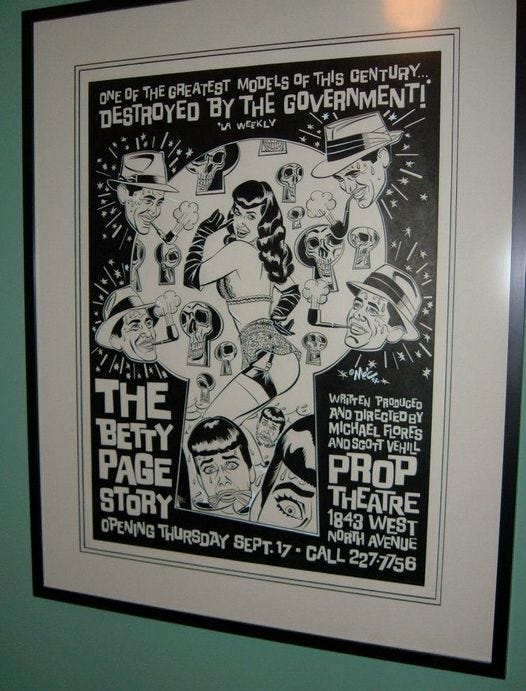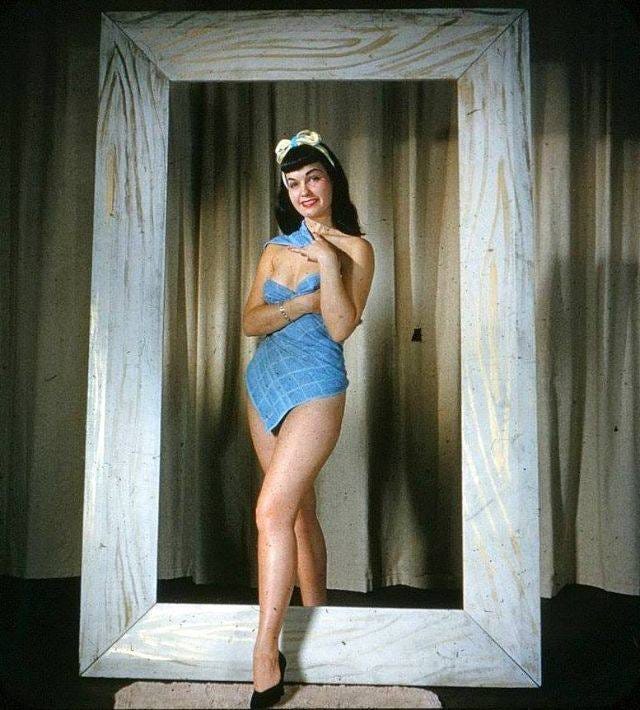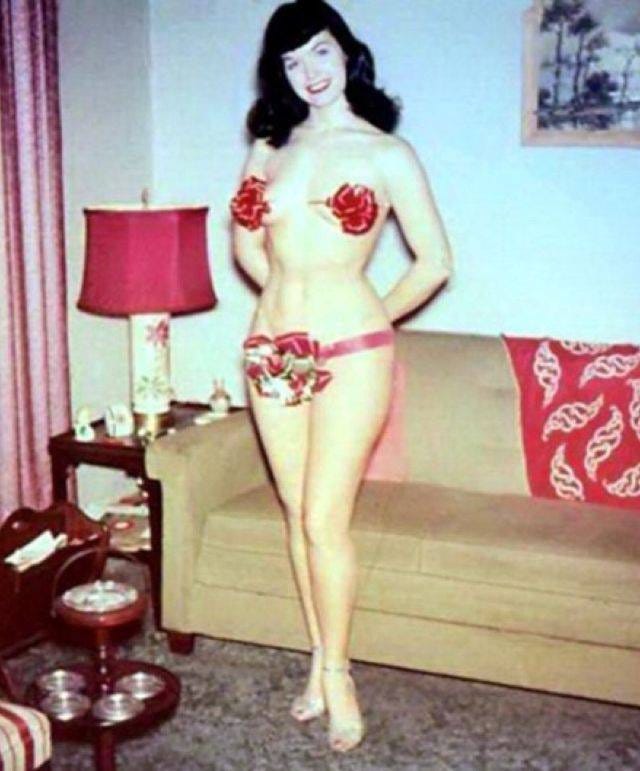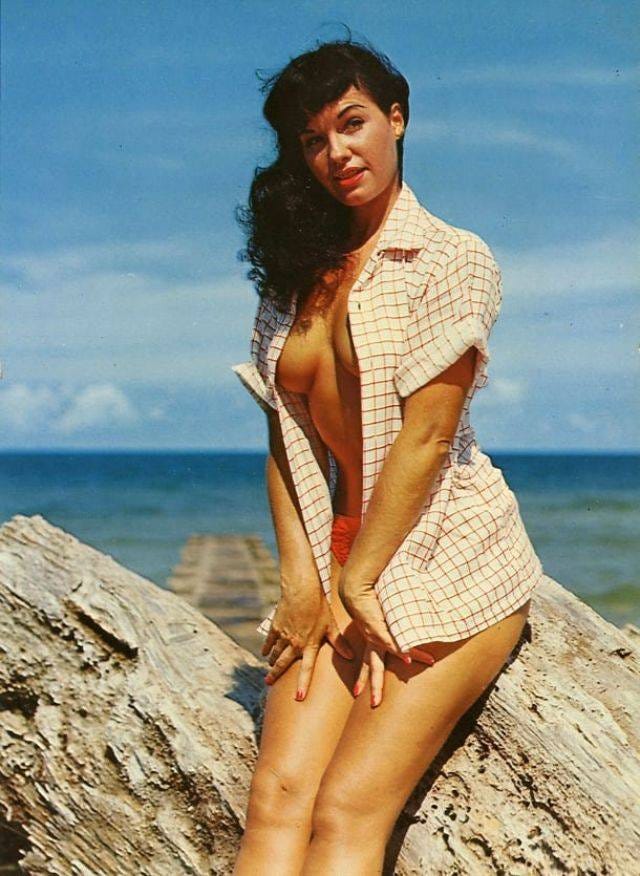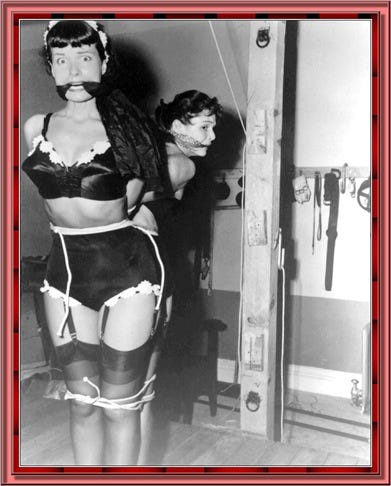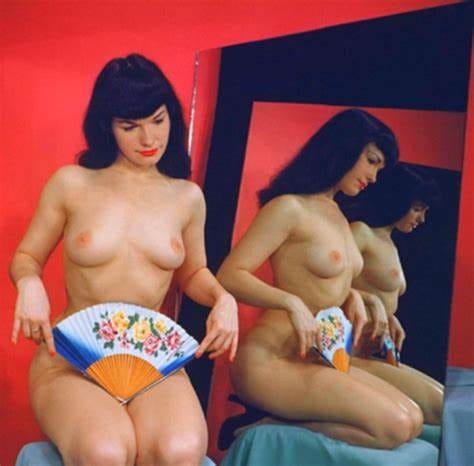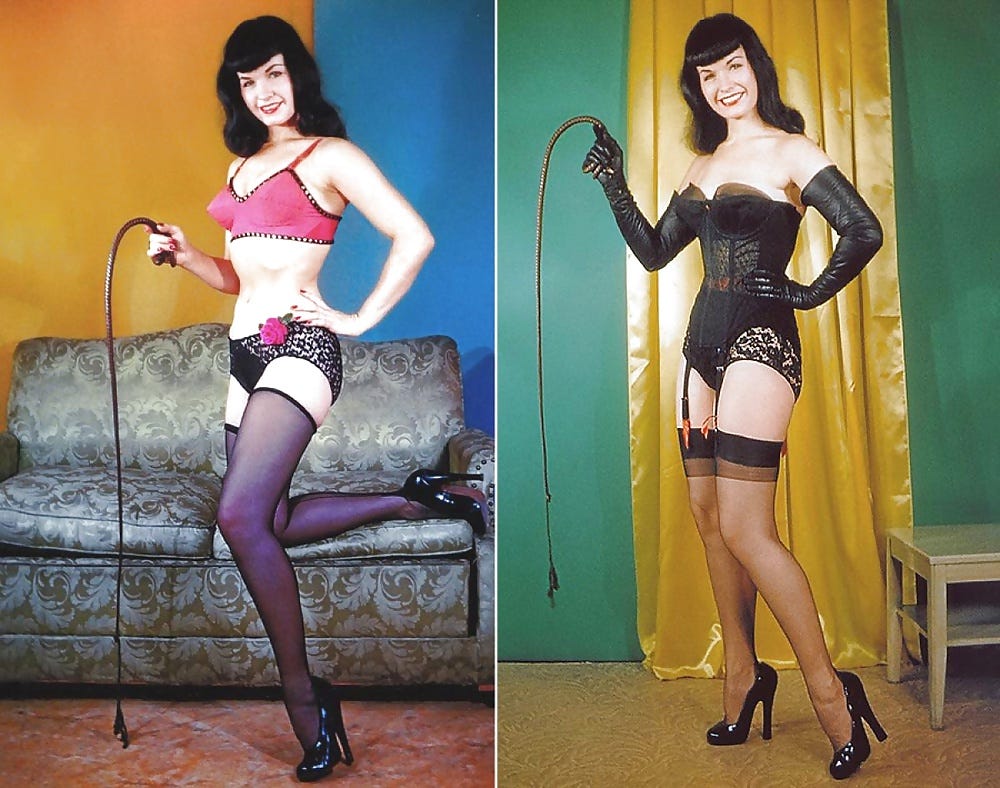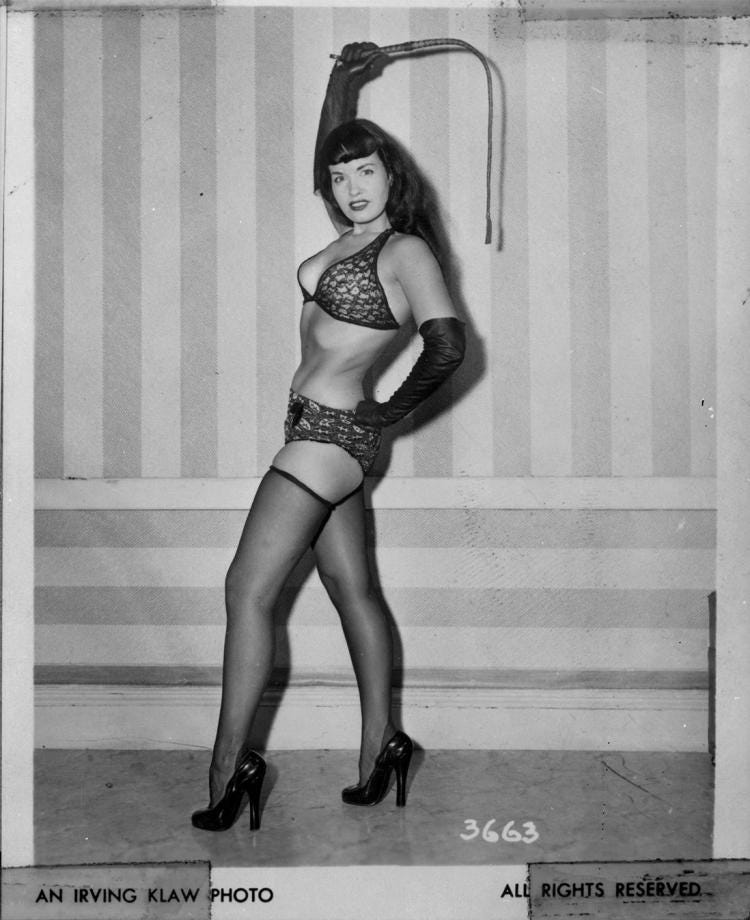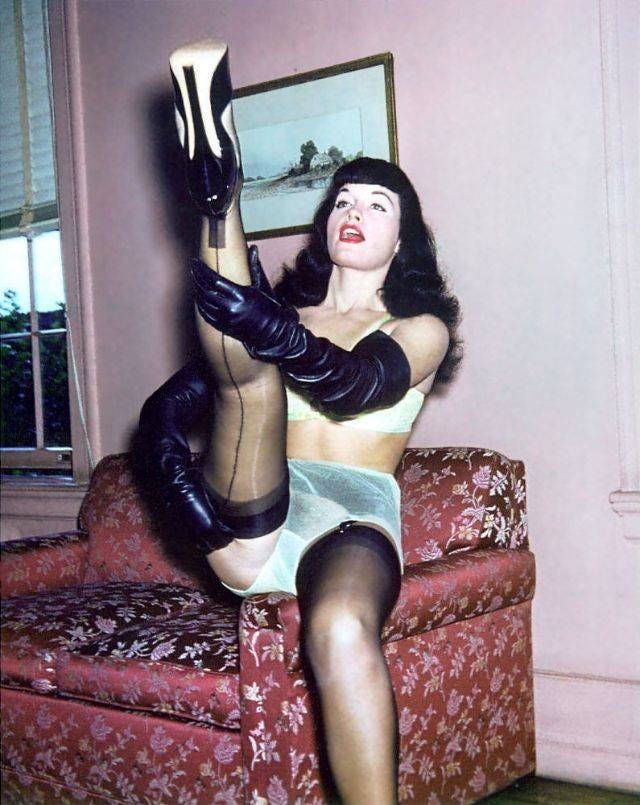Remembering Bettie Page On Her Birthday NSFW
She was the most photographed model in history- and was banned by the government! All her photos were ordered to be destroyed - bootleggers kept them alive!
I first saw a photo of Bettie Page at a comic book convention at the age of 13. I was mesmerized. Here was a woman who seemed to be looking directly at me, the girl next door with her sexuality fully in bloom. Who was she, I asked and was told her name but that little was known about her since she disappeared after her photos were banned by the government.
What?
This began my introduction to burlesque, striptease, belly dancers, bondage/sex games, heels and stockings, the world of private models - I mean that photo changed my life. Powerful, beautiful sexual women became my quest, lucky for me the pill was out and free love was the fad and there was no feminism.
I would go on to do plays about her, a film (don't blame me, I didn't have final cut) and have lectured on her.
A friend of Bettie's went to Tower Records to buy a relative a gift and was shocked to see a large standup of Bettie, models to assemble, calendars, her pictures on CD's. The woman left without making her purchase and brought Bettie with her back to the store.
Bettie Page, the woman who had left the limelight after the government condemned her and ordered her pictures destroyed was suddenly standing in shock in front of an altar to her. There were copies of a magazine called IN SEARCH OF BETTY PAGE, posters, copies of the films she made and photos that the courts had ordered destroyed.
I had the chance to talk to her a few times and took it. She still had the Southern accent that cuts through you like a hot knife on warm butter. She still hadn't wrapped her mind around the idea that many women look up to her today and even emulate her style and look. ( Bettie made almost all of her clothes right down to the swimsuits). She had read the play I had written and I sent her a video of the play. She liked it and pointed out where I was wrong in the information. She understood that was because at the time of writing it, she was still in hiding.
Maybe the word hiding is too strong a word. She had moved on, dealt with the disgrace and public humiliation she was subjected to and lived long enough to see those children whose parents condemned her, embrace and appreciate her.
Here an actor writes about one of my plays about Bettie. I think of my 19 plays, 1/2 were about burlesque!
Happy Birthday Bettie Page
The Subversive Purpose of "Bettie Page Uncensored"
Michael Flores has rewritten "Bettie Page Uncensored" numerous times. It shows. In fact, the writer-director-producer of this on-going "project" tells me he's not in the theatre business but in show business. That shows. And he doesn't go about his business by predictable routes. Maybe that's why he's come up with a winner: he begins with a subversive purpose.
Still, through all of his re-writes, and through all of the cast changes, the message Flores brings out in his show survives -- it even refuses to be overshadowed by the nudity that might bring in audiences at first encounter. It's a sneaky, subversive thing to do to an audience: promise them a little spice, then hit them with the thesis that women matter, and that the 1950s were brutal to women who believed that.
In that sense, the life of Bettie Page, who is still alive but lives in seclusion in California today, is merely the frame for an unabashedly feminist play. It is a play, however, that doesn't toe the tacit, anti-erotic line of mainstream feminism. It is assuredly not the feminism of Catharine MacKinnon and Andrea Dworkin, who are out of the mainstream. No, "Bettie Page Uncensored" is more a Camille Paglia-type feminist play. This third incarnation of the life of the "pin-up girl who shocked the world" succeeds in portraying women as creators of their own destinies and as unabashedly sexual creatures -- and succeeds wonderfully, even if the women themselves do not.
No one questions that men are entitled to control their own lives, or that they are entitled to control their own sexuality. What "Bettie Page Uncensored" points out is how the double standard works when enforced as enthusiastically as it was in the 1950s, a time few of us, even those who lived through it, including this actor, can recall. Even today, many still have trouble accepting women as equal parts serious and sexual, even though men get that kind of respect.
"Bettie Page Uncensored" brings back to life, and currency, the sexually repressive days of "I Like Ike." The play reminds us of the limited choices open to women at the dawn of the feminist age: wife, teacher, secretary, nurse. Bettie Page herself tried most of them but found herself in a career that was out of the mainstream -- and that's when the sky fell on her. The life of Bettie Page is the vehicle for exploring that time. The advantage in our day is seeing just how obvious the agenda and standard was in the 1950s.
From the opening sounds, when we heard radio personality Buzz Kilman interview "Bettie Page" as a 77-year-old woman (in the voice of Elisabeth Oas, who played Bettie on-stage for the first, and half of the second, versions of the play), the 1950s is set in tone and style for us: sex was not talked about; divorce was a scandal; cohabitation was illegal; pictures of women in their underwear, as you might see in lingerie catalogs distributed openly today, had to be sold under the counter, and so on.
An Assertive Bettie Page
So what happens to women who pose wearing something less than their underwear? We find out in the opening scene, as "Bettie" recalls and Saturday Evening Post reporter Tiffany Amber (Lori Garrabrant) chronicles. We first see Bettie Page (Sarah Masters) when she and Roz Greenwood (April Lynn Baker) are arrested for indecency -- something that surprises foreign-born model Anna Virtanen (Anna Shemeikka), who has grown up seeing undressed women in magazines sold openly in Europe.
But the Bettie Page we see in this show is not a victim: she stands up for herself, without shame for being arrested while men were "taking pictures of our bodies." She even argues with the judge. The judge (Ronald Bruce Meyer) doesn't quite know how to deal with an assertive woman and, with a sigh, reduces her indecency charge and sets her free.
But freedom for 1950s women, especially women who do bondage and nude posing, is short-lived, if not illusory. While learning about Bettie's life -- from her first meeting with Paula and Irving Klaw (Lisa Hunter and Daniel Preble, respectively) to her browbeating by Sen. Estes Kefauver (Meyer again) -- we learn that a woman may be paid a mere $35 a week to be a secretary, but may get $50 an hour to "pose and smile."
What does that say about how society values women -- and what a fight it would take, and has taken, to change things?
While Bettie Page is slightly above-average for your girl-next-door type, she respects marriage and is faithful to her husband; she doesn't drink, smoke, curse; she has a strong faith in God. (She could even be a Republican!) But life for such a straight arrow is not easy. Her initially naïve husband, Armand Walterson (Brian Patrick Gorman), tries to control her sexuality and her destiny, just like every other man, except Irving Klaw. How ironic that the only man who lets Bettie Page be herself is dragged before a government inquisition as a pornographer and a contributor to juvenile delinquency!
Though she never faced Sen. Estes Kefauver in real life, the confrontation between Kefauver and Page toward the end the play pretty much ends both their careers: Bettie's through fear of prosecution; Kefauver's through failure to arouse public outrage. Her employers, Paula and Irving Klaw -- "two nice Jewish kids from Brooklyn" -- are driven out of the business under threat of prison; Bettie disappears for 40 years for pretty much the same reason. Bettie discovers that being herself, that is, being a first-rate pin-up model, is too costly. For this she sacrifices her marriage and motherhood, her much-anticipated acting career, and finally even modeling for the camera. But she never believed she did anything wrong -- or anything important.
Bettie Page leaves a legacy of photos and a few films, partly preserved by Paula Klaw, in contravention of a court order to destroy all of the material she and her brother Irving created, and partly because those 1950s "camera club" amateurs saved many of her photos. It is said that the real Bettie Page never knew how popular she was until she was "rediscovered" in the 1990s. She is reported to be amused by all the fuss.
All this writer-producer-director Michael Flores portrays on-stage in a late-night show on a shoestring budget (his wife, Kat Southerland, runs the lights, sound and box office) with strictly local talent. Even if you have never heard of Bettie Page, you'll "get it" if you've seen this play. Tonight, as this subversive play closes, I reflect on how Michael Flores has accomplished something I find significant: not only his bait-and-switch -- sexy women swapped for a poignant story about real women's lives -- but in its subversion of feminism as it's generally understood in today's politically correct, anti-sex, sexual harassment-sensitive, climate.
Recreating eight years in the 1950s, with a cast of eight in 80 minutes, is a tall order, especially with no sets and minimal props. Are the players up to the challenge?
The answer is... yes.
A Life of Bettie Page
Most lives don't mean anything, have no obvious purpose, unless viewed through a lens or at a certain angle. Here is where Flores as playwright is at his most subversive. The forceful performances of Sarah Masters and the others force us to identify with the struggle of women to control their destinies; we feel encouraged to root for Bettie Page. The play successfully evokes the 1950s and the relentless struggle required to achieve what liberation women have realized in our day. That's a pretty tall order for one play and eight actors. And it is a credit to the playwright and the actors that there is living flesh on the bones of this story.
Tonight "Bettie Page Uncensored" will close forever. I will miss it. The cast, crew and director have comprised a circle of friendship and support for a significant time. There will be a film, which will be a different look at the same story. Many of the current cast will be called on to recreate their roles. Through Flores's film I expect the subversive purpose of "Bettie Page Uncensored" will reach a larger and even wider audience.
The real Bettie Page still doesn't believe she did anything important as a model. "Bettie Page Uncensored," the show that baits us with babes, then sells a subversive story about freedom, demonstrates just how modest a pin-up icon can be about her own greatness. That is why her fans, including myself, ever-respectfully disagree. Ronald Bruce Meyer
Behind the paywall: Why Burlesque Dancing Is Still So Popular - Secrets Of Burlesque
Keep reading with a 7-day free trial
Subscribe to The Acid Test 1967 to keep reading this post and get 7 days of free access to the full post archives.




